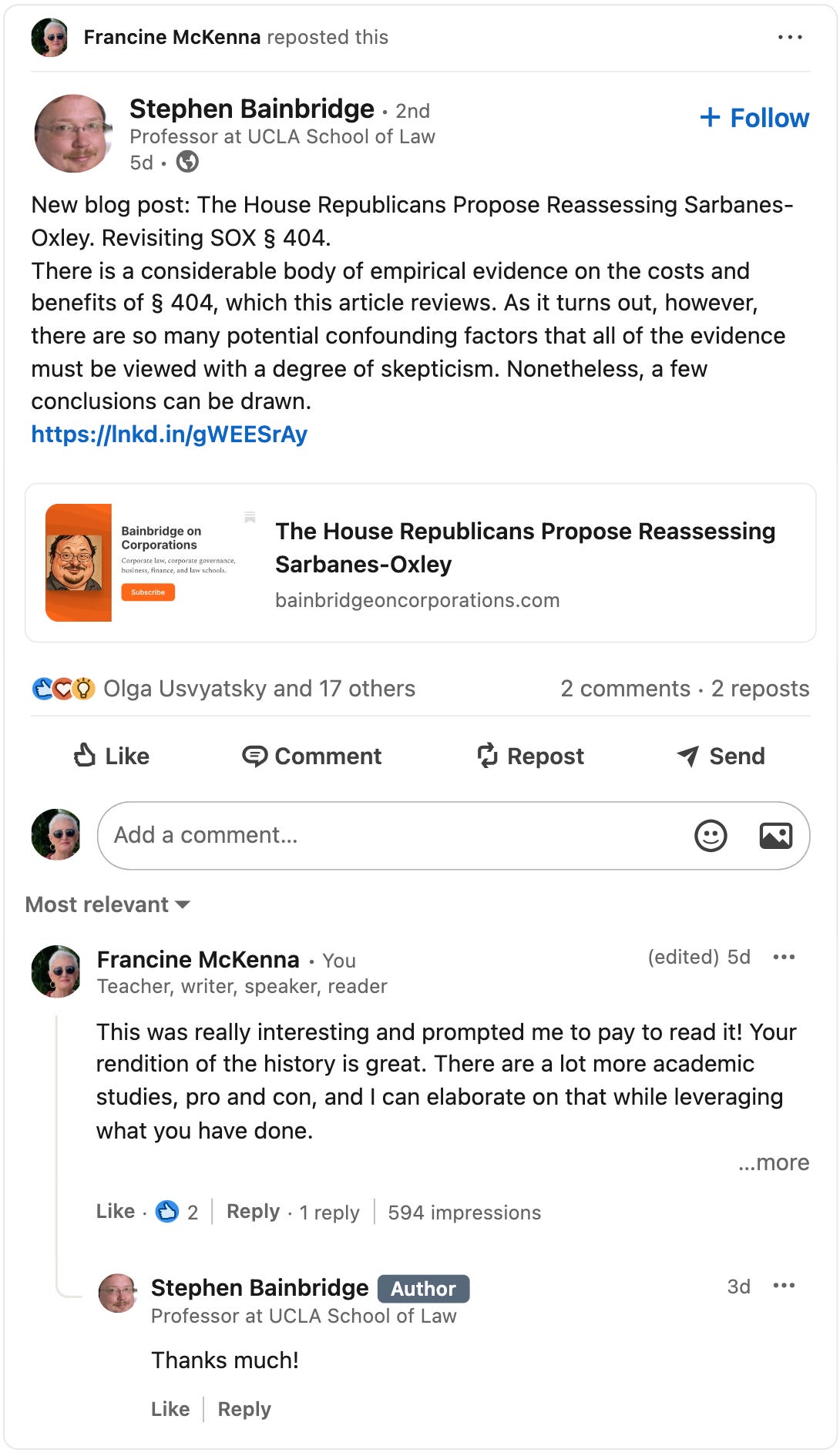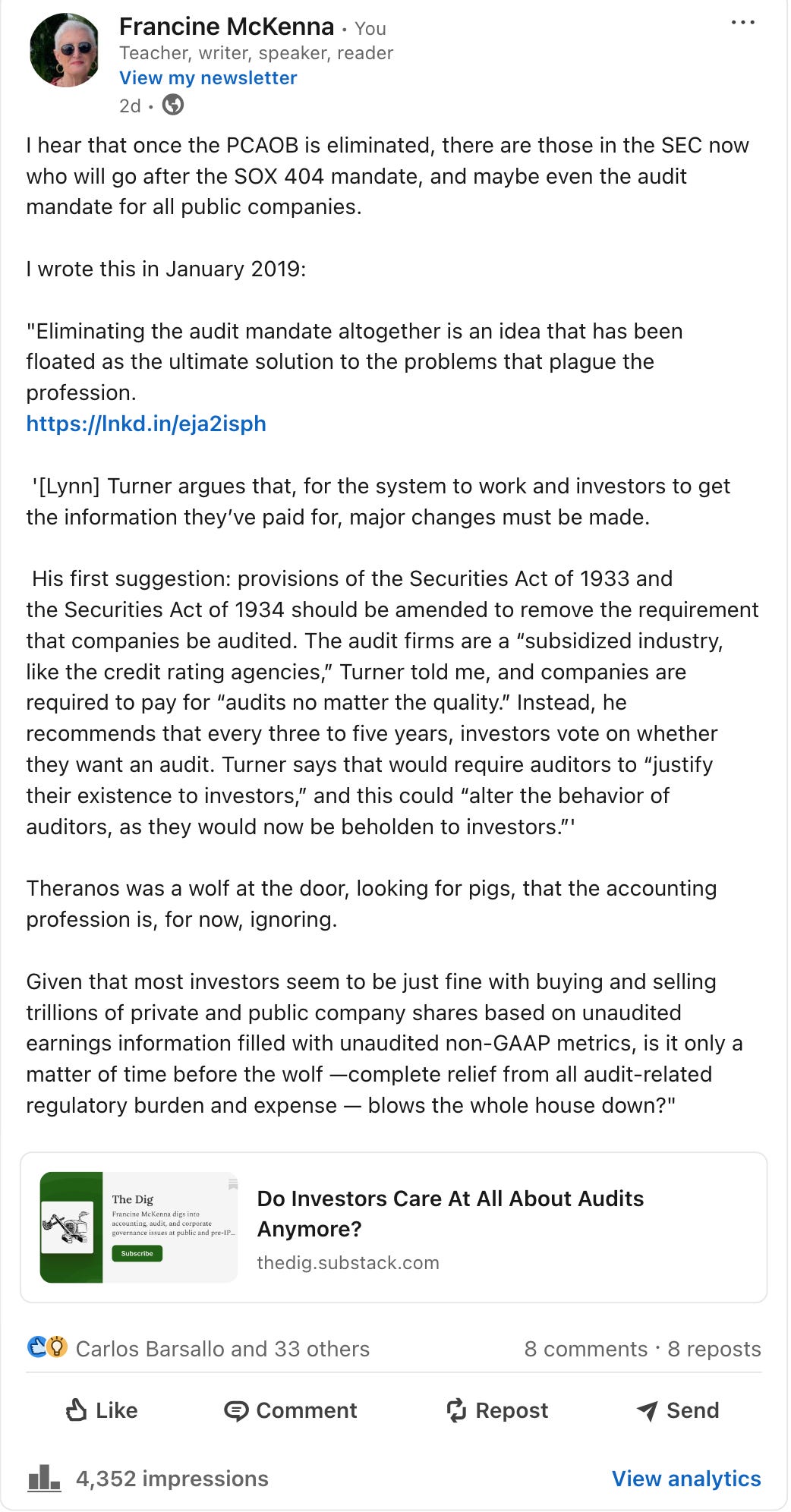A PCAOB update and something about deceiving auditors
Here's a bit more about the efforts, futile I think, to save the PCAOB and an exercise in memory to recall when, if ever, anyone has been really punished for lying to auditors.
Oh what a tangled web we weave
When first we practice to deceive. Sir Walter Scott (Marmion, 1808)
What's been happening with PCAOB?
I thought the PCAOB board members would have almost all been fired by now.
However, SEC Chair Paul Atkins may be gathering his strength, especially as it looks like there is trouble in “Big Beautiful Bill” paradise?
Maybe a Friday Night Dump?
Some good souls are attempting what I think is a futile effort to save the PCAOB. Former SEC Chief Lynn Turner thinks it's an important effort, but even he has to admit that, in the end, it probably won't work.
In this article in Corporate Crime Reporter, Lynn Turner, a former SEC Chief Accountant, states that “the Democrats in the Senate are likely to go to the Parliamentarian and seek a ruling that some of this legislation that gets put into the so-called Big Beautiful Bill is not relevant to the budget and therefore cannot be included in the Big Beautiful Bill.”
Turner says “the question then becomes – does the parliamentarian want to keep her job or not? If you are in one of these senior roles in DC today, the question is – are you going to give them the answer they want, or are you going to give them what you think is the right answer? If you give them an answer and they don’t like it, there is a good chance you are going to be unemployed within 24 hours.”
Turner concludes: “If I were betting on this, I would bet that it will go through. I hope it won’t.”
All the letters bang the same drums: there'll be more fraud risk and the foreign auditor inspection regime will be dismantled. Some count on the technicality of the provision being kicked out of the bill. Fat chance!
Dan Goelzer is posting away, here and here.
Frankly, I think the folks who want to eliminate the PCAOB do not value audits and don't give a flying tomato about these arguments.
The elimination of the PCAOB was shoved into a budget reconciliation bill because it would be easy to focus general business media attention on everything else wrong with the bill and ignore wonkery about the PCAOB.
Count on this: The dismantling of the PCAOB by theoretically folding it into the SEC is just a first step. Plans are much bigger than that. Some are already moving on to SOx 404.
A Mixed Verdict
After twenty years and billions in compliance costs, what's the verdict on Section 404? The answer depends on your perspective.
For regulators, the fact that they were able to provide meaningful relief to smaller companies shows that the system can respond to criticism and adjust course—something that doesn't always happen with federal regulations.
For investors, the benefits remain unclear. While disclosure of control weaknesses provides some information, it's questionable whether the massive compliance costs are justified by the relatively modest improvements in financial reporting quality.
For companies, particularly smaller ones, Section 404 remains a significant burden that affects real business decisions about financing, growth, and innovation.
I thought about listing all the academic research, pro and con, regarding the PCAOB. If you want to read it, some of it is in our working paper, “Deconstructing the PCAOB: Using Organizational Economics to Assess the State of a Regulator”.
Instead, I took it one logical step further in a LinkedIn thought bubble that got a lot of feedback.
Do Investors Care At All About Audits Anymore?
Back in October I wrote here that a very long list of sophisticated investors including my ultimate boss, Rupert Murdoch of News Corp., and business partners like Walgreen’s made the decision to invest hundreds of millions of dollars in the private start-up Theranos but didn’t insist on seeing audited financial statements first. From its incorporation i…
In the end, the SEC is set on cutting its own ranks and anything else it can control. It has already significantly reduced staff, but has asked for the same budget as F2025 despite the reduced staff. I do not think, despite pie in the sky proclamations, that the Atkins SEC has any intention of continuing PCAOB activities, especially enforcement and standard-setting activities.
Bruce Carton recently highlighted SEC Chair Paul Atkins’ "Testimony Before the United States Senate Appropriations Subcommittee on Financial Services and General Government" related to the budget request for F2026 and commented:
My response, delivered to BC on LinkedIn where he posted his newsletter link:
In addition to SEC Enforcement being gutted by staff departures, Corp Fin seems to be at a standstill in many of the most important activities such as writing comment letters. That's what my friend and frequent collaborator Olga Usvyatsky wrote at her newsletter Deep Quarry.
Olga was cited extensively in CorporateCounsel.net.
And the fantasy that the SEC can seamlessly fold in PCAOB audit firm inspections? My brothers and sisters, please!
The SEC plans on barely double digit percentage coverage on the inspection activities it already has responsibility for.
That coverage has been dwindling for a long time, creating vulnerabilities that led to Madoff, PFG Best, and other broker-dealer and investment advisor fraud fraud misses.
We’ve seen that customers or broker dealers and private firms can not count on the self-regulatory regime to cover these industries.
According to the SEC’s 2011 annual report, the SEC and Self-Regulatory Organizations (SROs) like the National Futures Association have been doing fewer and fewer exams of broker-dealers during the last five years.
The SEC admits it will never happen for investment advisors:
"The anticipated decline in the number of registered investment advisers following the effective date of Title IV of the Dodd-Frank Act — the Private Fund Investment Advisers Registration Act (“Title IV”)12 — could result in a greater percentage of registered investment advisers being examined. The amount of any potential increase in examination frequency, however, may be offset by the need to divert examination resources to fulfill new examination obligations that the Commission was given by the Dodd-Frank Act. Moreover, the Staff expects the number of registered investment advisers to grow in subsequent years. While the Commission’s resources and the number of OCIE staff may increase in the next several years, the number of OCIE staff is unlikely to keep pace with the growth of registered investment advisers.
As a result, the Staff believes that the Commission likely will not have sufficient capacity in the near or long term to conduct effective examinations of registered investment advisers with adequate frequency. The Commission’s examination program requires a source of funding that is adequate to permit the Commission to meet the new challenges it faces and sufficiently stable to prevent adviser examination resources from periodically being outstripped by growth in the number of registered investment advisers (i.e., it requires resources that are scalable to any future increase ― or, for that matter, decrease ― in the number of registered investment advisers)."
After the paywall, I'll write about Lottery.com, SOx Section 303, and the general lack of enforcement of some of Sarbanes-Oxley's more obscure provisions.














